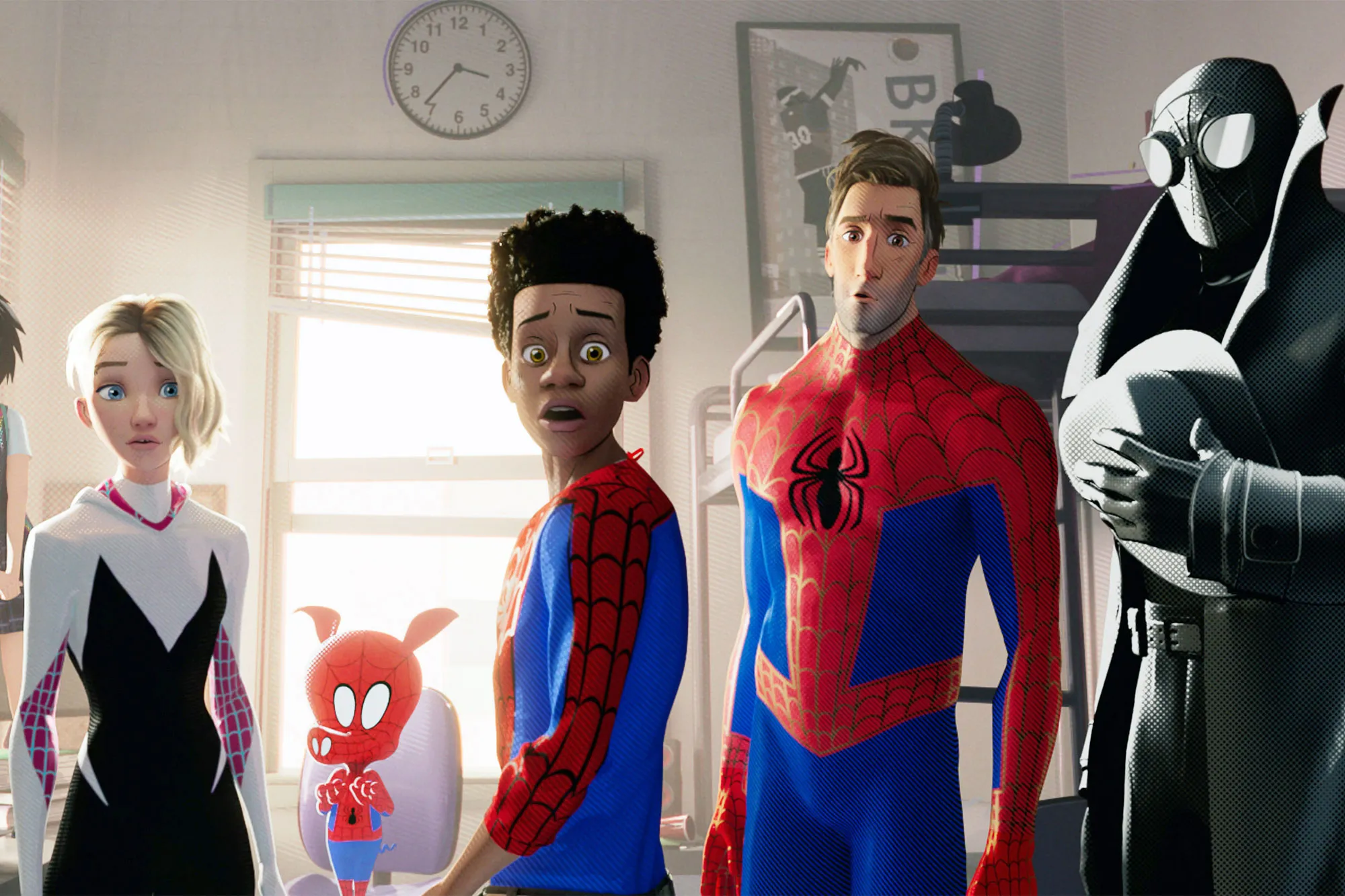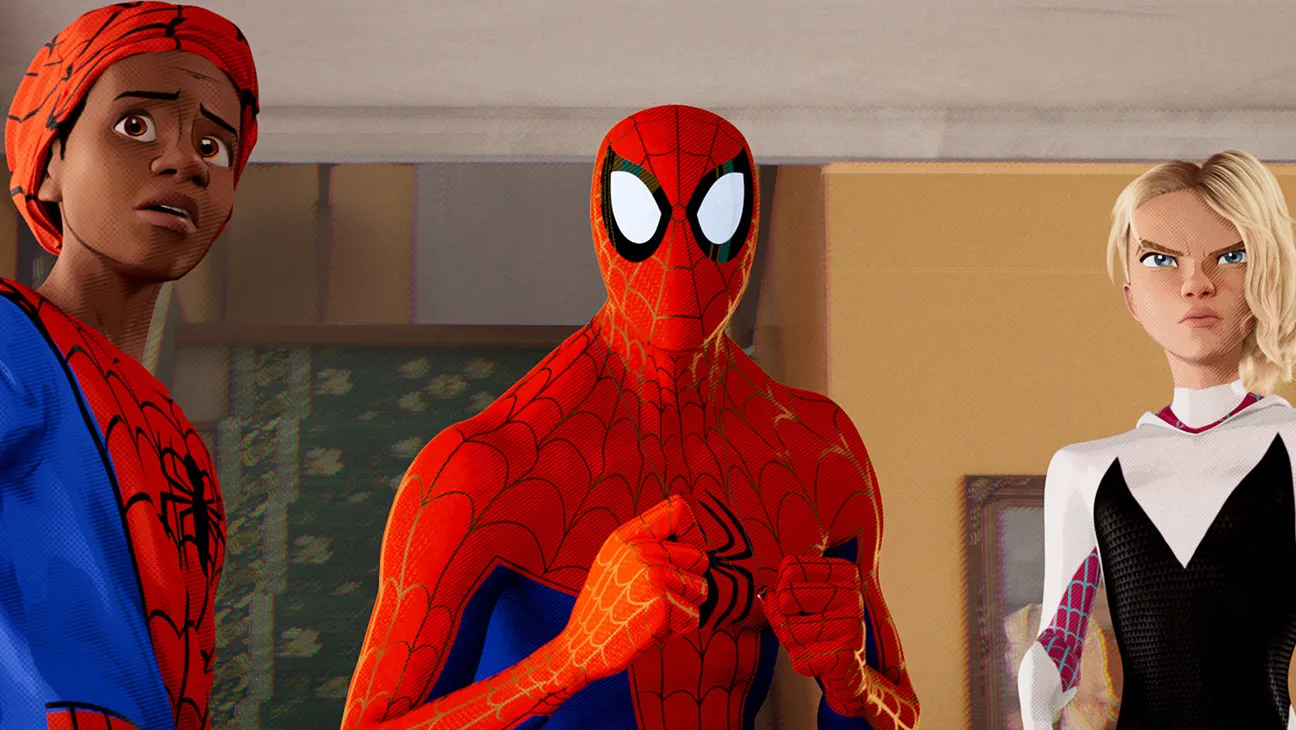🎬 Spider-Man: Into the Spider-Verse (2018)

Spider-Man: Into the Spider-Verse (2018) – A Spectacular Leap into the Multiverse
When Sony Pictures Animation introduced audiences to Spider-Man: Into the Spider-Verse in 2018, it not only redefined what a superhero film could be but also set a new benchmark for animated storytelling. Directed by Bob Persichetti, Peter Ramsey, and Rodney Rothman, this film is a visual and narrative masterpiece that dares to experiment with its medium and dive deep into the heart of what makes Spider-Man such an enduring cultural icon.
A Bold New Spider-Man
The film’s protagonist, Miles Morales (voiced by Shameik Moore), offers a refreshing departure from the traditional Peter Parker narrative. Miles is a Brooklyn teenager navigating the typical challenges of adolescence while dealing with the extraordinary circumstances of gaining superpowers. His journey from self-doubt to self-discovery is central to the film’s emotional core.
Unlike previous Spider-Man adaptations, Into the Spider-Verse introduces a multiverse filled with alternate Spider-People, including the seasoned and somewhat disillusioned Peter B. Parker (voiced by Jake Johnson), the stylish and confident Spider-Woman/Gwen Stacy (voiced by Hailee Steinfeld), the noir-inspired Spider-Man Noir (voiced by Nicolas Cage), the anime-esque Peni Parker (voiced by Kimiko Glenn), and the hilarious cartoon pig Spider-Ham (voiced by John Mulaney). This ensemble not only brings diversity but also explores different facets of heroism.
A Revolutionary Animation Style
What sets Into the Spider-Verse apart from other animated films is its groundbreaking visual style. The film employs a mix of hand-drawn techniques and computer-generated imagery to create a comic book aesthetic. Every frame feels like it was lifted directly from the pages of a graphic novel, complete with dynamic paneling, halftone textures, and vibrant color palettes.
The animation’s kinetic energy perfectly mirrors the action-packed sequences, while its inventive use of motion blur and onomatopoeia pays homage to its comic book roots. This attention to detail extends to the way each Spider-Person is animated uniquely to reflect their universe—Spider-Man Noir’s black-and-white palette, Peni Parker’s anime-inspired movements, and Spider-Ham’s Looney Tunes-esque physics.
A Multiverse of Themes
At its core, Spider-Man: Into the Spider-Verse is a story about identity, legacy, and the universal appeal of Spider-Man. The mantra “Anyone can wear the mask” resonates throughout the film, emphasizing that heroism isn’t about who you are but the choices you make. This theme of empowerment is particularly significant for Miles, whose mixed-race background and urban upbringing make him a relatable and groundbreaking protagonist.
The film also delves into themes of mentorship and grief. Peter B. Parker’s mentorship of Miles provides a compelling dynamic, as both characters learn and grow from each other. Meanwhile, Miles’ relationship with his father, Jefferson Davis (voiced by Brian Tyree Henry), and the loss of his Uncle Aaron (voiced by Mahershala Ali), who secretly operates as the Prowler, add layers of emotional depth.
Stellar Voice Cast and Soundtrack
The voice performances in Into the Spider-Verse are impeccable. Shameik Moore captures Miles’ youthful exuberance and vulnerability, while Jake Johnson’s Peter B. Parker adds humor and heart. Hailee Steinfeld’s Gwen Stacy is confident yet emotionally nuanced, and Nicolas Cage’s Spider-Man Noir is hilariously over-the-top.
Complementing the voice work is the film’s outstanding soundtrack. Featuring tracks like Post Malone and Swae Lee’s “Sunflower” and Jaden Smith’s “Way Up,” the music blends hip-hop, pop, and electronic influences to reflect Miles’ world. Daniel Pemberton’s score further elevates the film with its experimental and genre-bending compositions.
Breaking Superhero Tropes
In a genre often criticized for formulaic storytelling, Into the Spider-Verse is refreshingly original. The film’s self-awareness and humor playfully subvert superhero tropes, while its multiverse concept expands the possibilities for storytelling. The inclusion of lesser-known Spider-Man characters introduces audiences to the rich tapestry of the Spider-Man mythos.
Moreover, the film’s villain, Kingpin (voiced by Liev Schreiber), is given a tragic backstory that adds complexity to his motivations. His determination to reunite with his family, regardless of the consequences, provides a compelling counterpoint to Miles’ journey.
Cultural and Industry Impact
Spider-Man: Into the Spider-Verse has had a profound impact on both audiences and the animation industry. Its critical and commercial success proved that animated superhero films could be as impactful as live-action ones. The film won the Academy Award for Best Animated Feature, a testament to its innovation and artistry.
Culturally, the film’s representation of Miles Morales as a biracial hero resonated with audiences worldwide. It demonstrated the importance of diverse storytelling and the power of seeing oneself reflected on screen.
Conclusion
Spider-Man: Into the Spider-Verse is more than just a superhero film; it’s a celebration of creativity, individuality, and the enduring appeal of Spider-Man. With its revolutionary animation, compelling characters, and heartfelt narrative, the film has cemented its place as a modern classic.
For fans of animation, comic books, or simply great storytelling, Into the Spider-Verse is an unmissable experience. Its legacy will undoubtedly inspire future filmmakers and animators to push the boundaries of what’s possible in cinema.










